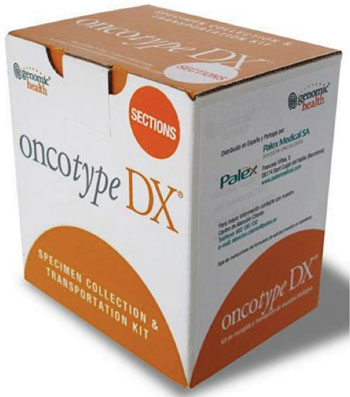Gene Test Validated for Breast Cancer Therapy
By LabMedica International staff writers
Posted on 13 Oct 2015
A genetic test has been clinically validated in predicting which patients with early-stage breast cancer are unlikely to benefit from chemotherapy.Posted on 13 Oct 2015
Many women with hormone receptor-positive breast cancers also undergo chemotherapy in order to destroy any cancer cells that many have spread beyond the breast and reduce the risk of recurrence. While some of these women may not need chemotherapy, there is currently no effective way of determining which women could safely avoid the treatment.

Image: The Oncotype DX specimen and collection kit for Breast Cancer Recurrence Score Assay (Photo courtesy of Genomic Health).
A large team of scientists led by those at the Montefiore Medical Center (Bronx, NY, USA) used a 21-gene expression assay on 10,273 women ages 18 to 75 who had early-stage, hormone receptor-positive breast cancer, whereby the cancer is driven by estrogen or progesterone and that did not overexpress human epidermal growth factor receptor (HER2). Prospective validation was performed with the use of archival tumor specimens from completed studies that used a prospective–retrospective design.
All the patients had an Oncotype DX Recurrence Score (Genomic Health, Redwood City, CA, USA), a reverse-transcriptase–polymerase-chain-reaction 21-gene assay performed on ribonucleic acid (RNA) extracted from formalin-fixed paraffin-embedded tissue, performed in a central laboratory. Patients with a score of 0 to 10 were assigned to receive endocrine therapy alone, and those with a score of 26 or higher were assigned to receive chemotherapy plus endocrine therapy.
A total of 1,626 of whom were eligible, which was 15.9% of the total eligible population had a recurrence score of 0 to 10 (indicating low risk), 6,897 of whom were eligible which was 67.3% of the total eligible population had a score of 11 to 25 (indicating midrange risk), and 1,730 of whom were eligible being16.9% of the total eligible population, had a score of 26 or higher (indicating high risk). The median follow-up in the low-risk cohort was 69 months. The team found that around 99% of low-risk women treated with hormone therapy alone did not experience breast cancer recurrence within five years. Furthermore, the rate of invasive disease-free survival at five years was almost 94%, while the risk of cancer returning at a distant site was less than 1%.
The authors concluded that their prospective study involving uniformly treated patients with hormone-receptor-positive, HER2-negative, axillary node-negative breast cancer supports the clinical validity of the 21-gene assay in identifying patients who may be safely spared adjuvant chemotherapy. Joseph A. Sparano, MD, the lead authors of the study, said, “The compelling results seen in this global study provide unequivocal evidence supporting the clinical utility of Oncotype DX to risk-stratify patients with early-stage breast cancer, and indicate that the findings are generalizable to everyday clinical practice.” The study was published on September 28, 2015, in the New England Journal of Medicine.
Related Links:
Montefiore Medical Center
Genomic Health














